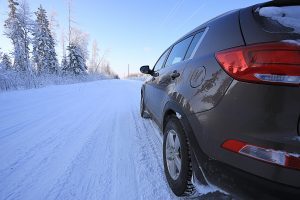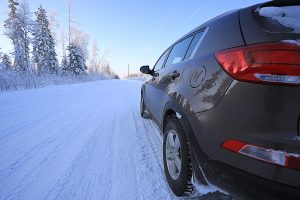 People in South Florida rarely have to deal with winter-weather when it comes to the roads. A cooler temperature is often the only thing that signifies a change in the season. What if you are traveling? Now is one of the most popular times of year for travel as people celebrate the holidays.
People in South Florida rarely have to deal with winter-weather when it comes to the roads. A cooler temperature is often the only thing that signifies a change in the season. What if you are traveling? Now is one of the most popular times of year for travel as people celebrate the holidays.
With snow and ice forecasted for much of the country in the coming weeks, knowing how to handle yourself on slick roads is important, especially if you aren’t used to driving on them on a regular basis. To better prepare you, we’ve put together a list of the most common causes of winter-weather accidents and how you can avoid them.
1. Icy Roads
Without a doubt, icy roads are one of the top causes of winter-weather car accidents, if not the top cause. Icy roads change the way your car handles and you have to be ready to react.
If you encounter an icy road, your best bet is to slow down. Braking or accelerating should be avoided if you are on ice. If you come across a surprise patch of ice, or black ice, don’t slam on your brakes. Coast over the patch and accelerate once you are clear of it. If you find yourself sliding, steer the same way your front tires are trying to go in order to regain control of them. Once you regain control, gently steer your wheel in the direction you want to go. Avoid jerking the steering wheel in either direction as you will likely just find yourself spinning around.
2. Poor Visibility
Winter weather can affect your visibility, even if it isn’t actively snowing. Road spray and a general gray atmosphere can inhibit how far ahead of your vehicle you can clearly see. If you know that you are going to be driving in poor conditions, make sure your windshield washer fluid is topped off. Better yet, top it off with fluid that is rated specifically for winter weather. You can find this fluid alongside the same fluid you would use in the spring and summer. While you are at it, make sure that all of the other fluids in your car are topped off.
3. Tires
Bald tires and inadequate tire pressure are dangerous on slippery roads. If you haven’t checked the tread on your tires in a while, now is the perfect time to do it. If you don’t know how to check your tread, have someone else do it for you.
When your tires are bald or when the air pressure in them isn’t what it should be, your tires aren’t meeting the road as they were designed to do. This can put you at risk for accidents. Keep in mind, too, that the air pressure in your tires won’t be the same in the winter as it is in the warm weather. Don’t rely on your tire pressure monitoring system to warn you of a low level. By the time your dashboard lights up, your tire pressure is already dangerously low.
4. Snow and Slush
No one enjoys driving on roads that are covered in snow and slush. This is especially true when the plows haven’t had a chance to clear the road and the pavement is covered in deep tire tracks. If you can, stay in the tracks of the vehicles that have traveled in front of you. Your car can easily get pulled if you hit a deep pile of slush.
5. Stick to the Highways
Many people believe that it is safer to drive on side roads when the weather gets bad. This may not necessarily be true. In many cities, it’s the highways that are cleared first. These roadways will be plowed before side streets and they are more likely to have been salted. If you are traveling any distance and have the option of traveling down a highway, take it. As an added bonus, if you happen to get stuck or go off the road, you are more likely to be seen and rescued.
As someone who lives in Florida, you luckily don’t have to deal with winter-weather driving on a regular basis. That said, if you will be traveling anywhere north of the state, you may very well find yourself having to drive through snow and ice. When you know how to drive in this poor weather, you are more likely to avoid an accident.
We don’t believe that anyone should have to experience financial difficulty because they are involved in an accident that is due to someone’s negligence or poor decisions. If you have been involved in an accident in Miami, please reach out to our experienced team of personal injury attorneys. We will review the details of your accident and advise you of your legal options. Call today to schedule a free case evaluation.

